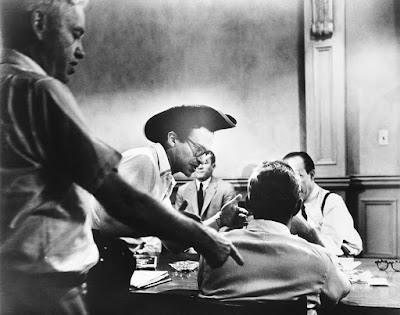Pickles have a pretty good provenance so far as movies are concerned. From at least as far back as Crossing Delancey to the recent and quite wonderful short titled Pickle, the briney cucumber has provided movie-goers with tasty fun. The latest addition is a much-better-than-you-might-expect comedy set in modern-day Detroit and featuring a based-on-reality tale of an elderly grandmother whose famous pickle recipe remains a secret that certain of her family members would love to unlock.
Co-written by Gary Wolfson (at left) who jumps off from his own family history (his grandmother went to her grave carrying that prized pickle recipe along with her) and Sheldon Cohn (below, right), the film may be awash with cliches, yet many of these are given a smart little twist that will have you chuckling in appreciation: the goy who must impersonate a rabbi (and does it surprisingly well -- for awhile, at least) or the psychic who turns out to channel the dead, after all.
The screenplay and dialog set up various challenges that must be risen to -- a divorced dad who needs to DJ his daughter's bat mitzvah, a son who desperately wants his mom's famous recipe, and a bit of a developing romance to turn the film toward rom-com territory. As directed by Michael Manasseri (shown below) with enough style and precision to make the laughs come to life, the movie simply bounces along from one enjoyable scene to the next, and before you know it, you're hooked and quite liking
the whole thing. Much of the enjoyment comes by way of the very good cast that has been assembled here, led by a veteran actress who is most often seen in smaller supporting roles: Lynn Cohen (shown below). How good it is to finally see Ms Cohen in a starring role, which, by the way, she fills out simply beautifully. This actress -- who has shone brightly in everything from Munich to Master of None to that little-seen-but-terrific indie, Hello Lonesome -- knows how to command an entire scene as easily as she does a small moment.
Supporting her are David Paymer (below, left), who plays her son, and Jon Dore (below, right), who plays her grandson. Both are just fine.
Kudos, too, to a couple of splendid further supporting actors who handle what, in other hands, might be paint-by-number roles with finesse and great good humor: Eric Edelstein (below, right), as the grandson's best friend, Ted, who must suddenly assume that Rabbi role, and Jean Zarzour (at bottom, right), who makes a marvelously quirky psychic.
Thanks to these fine performances, along with a consistently offbeat screenplay that appears to be tried-and-true but then adds that oddball touch that helps deliver the goods, THE PICKLE RECIPE proves not simply edible but pretty damned tasty overall.
The movie also, in its comedic-but-genuine way, manages to address the Holocaust. In a scene near the finale, with a sudden speech by the character played by Ms Cohen, the film becomes even more interesting and psychologically provocative. Does not what has happened here reflect what a lot of Holocaust survivors would do and feel?
The movie, from Adopt Films and running 98 minutes, opened here in South Florida this past Friday, October 28, and will hit New York and Los Angeles, this coming Friday, November 4. Click here to see all currently scheduled playdates with cities and theaters listed.




















































